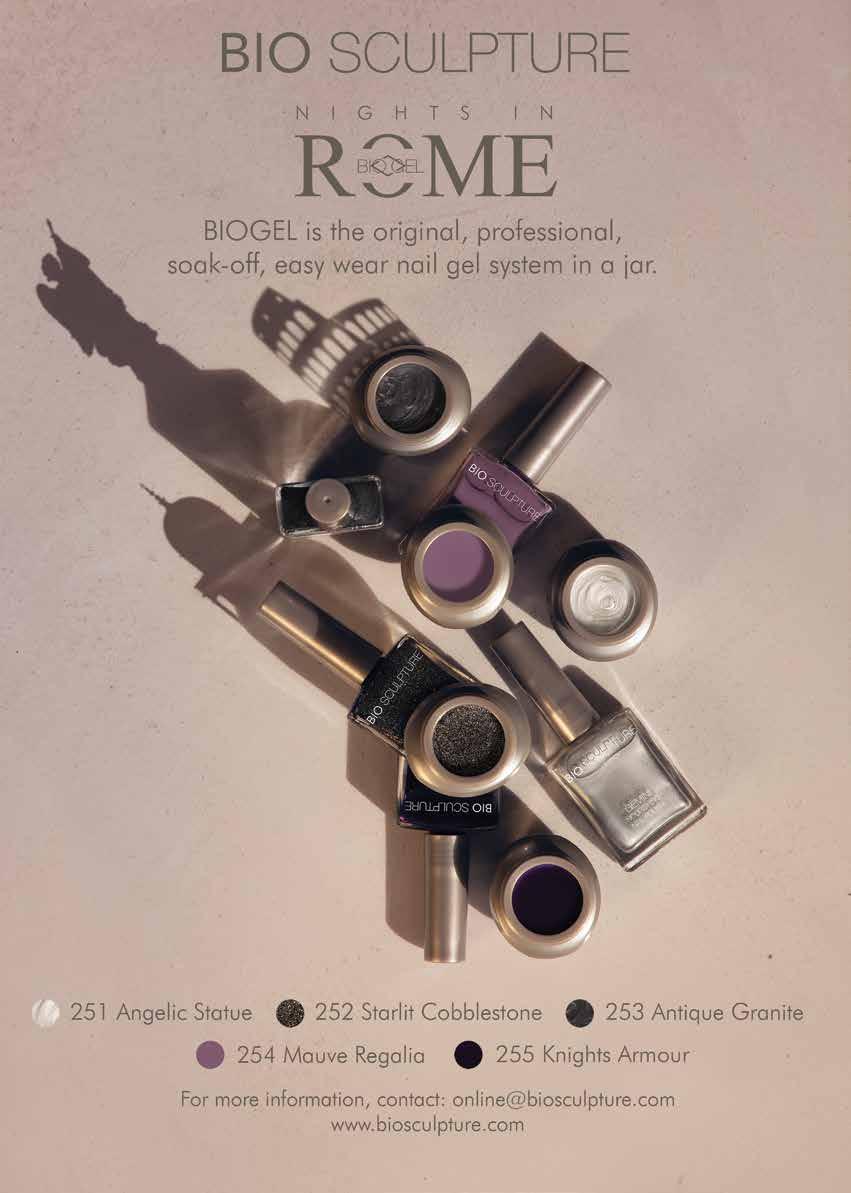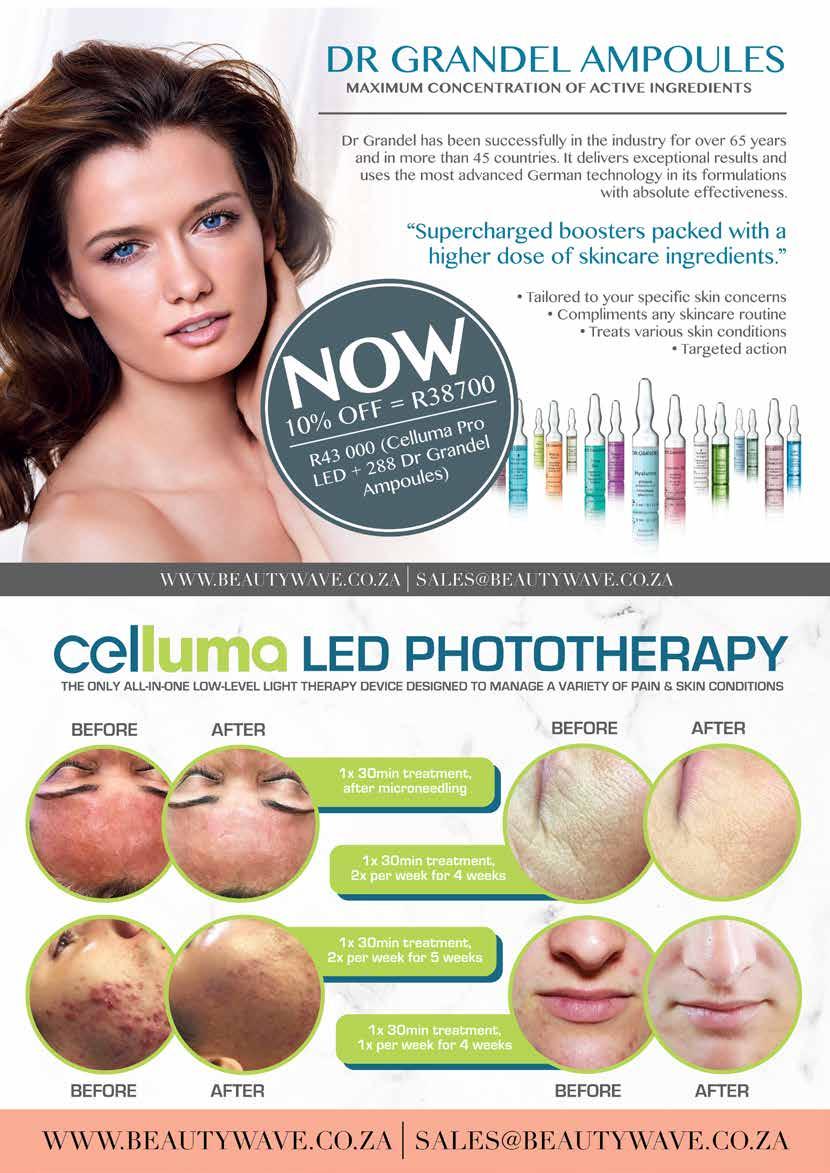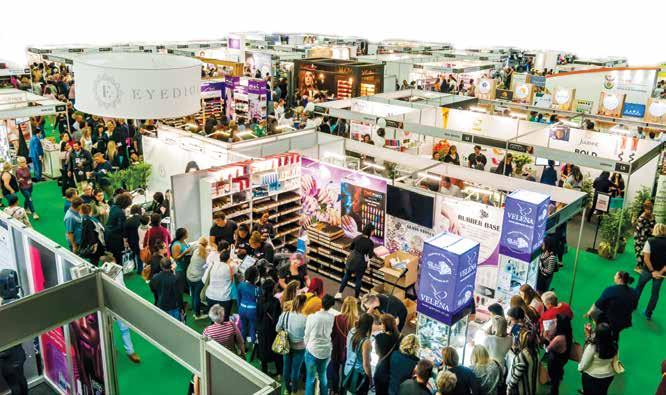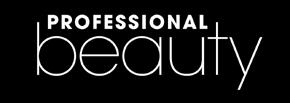
12 minute read
Industry news
News
Mpumalanga industry up in arms over Bargaining Council
Advertisement
Several beauty salons and spas in Mpumalanga are objecting to what they describe as the ‘bullying tactics’ of the National Bargaining Council for the Hairdressing Cosmetology Beauty & Skincare Industry in South Africa.
The Council takes its statutory authority from the South African Labour Relations Act (Act 66 of 1995), with registration to the Council mandated by the Main Collective Agreement, as signed by the Minister.
A spa owner in the Mpumalanga area, who wished to remain anonymous, told Professional Beauty that some businesses had shut their doors as they were unable to meet the Council’s levies, with numerous therapists retrenched.
Professional Beauty contacted the Council’s acting CEO, Frik Bekker, for comment. He replied: “We are not aware of any owners who closed down in Mpumalanga, or of any therapist retrnechments.” The spa owner continued: “Myself and other owners in the area find the Council levy structure outrageous and believe that the Mpumalanga industry pays the highest Council levies in South Africa.”
Bekker responded: “The Council levy is payable by the employer and the employee. For establishments registered prior to November 2017, there is a fixed rate applicable to both the employer and employee contribution, in line with other provinces in South Africa. For establishments registered after November 2017, the contribution by the employer and employee are both based on 1.3% of the Contributing Wage.
“Because Mpumalanga falls within the extension of scope of the Council, we’ve phased in the levies – contributions are limited to 60% in year 1 (2020), 80% in year 2 (2021) and then only 100% in year 3 (2022).”
Pension Fund A big area of contention is the Pension Fund. Said another spa owner, who also did not wish to be named: “The Council is pressuring us to contribute to the Pension Fund but our therapists are unwilling to pay a substantial chunk of their monthly salary to a pension fund, as they need that money for transport, etc. Similarly, many owners can’t afford to match each therapist’s monthly Pension Fund fee. And, we’ve been given no indication of the Pension Fund payout.” Bekker responded: “The Parties to the Council – the EOHCB (Employers Organisation for Hairdressing Cosmetology and Beauty) and the Union – negotiate the contributions for all funds applicable to industry on an annual basis. The HBSI (Hairdressing Beauty Skincare Industry) Pension Fund contribution is 12% of the prescribed minimum salary, with 6% payable by the employee and 6% payable by the employer based on the prescribed minimum salary as published in the wages schedules. For Mpumalanga, the contributions payable have been phased to only include 60% of the contributions in year 1, 80% in year 2 (2021) and then only 100% in year 3 (2022).
“Owners can apply for exemptions from the Pension Fund should they wish to rather utilise an alternative fund, as long as benefits are equal or greater than the HBSI Fund.”
He noted that the HBSI Fund will only pay out should the employee retire, leave the industry completely, become permanently disabled, or pass away. Then, the accumulated savings, as well as three times the employee’s prescribed annual salary, and the funeral benefit will pay out to the beneficiaries.
Illegal businesses Owners believe that while they are being pressured into complying with the Council, there are several illegal hair and beauty salons in the area that the Council refuses to approach.
According to Bekker, the Department of Labour has exempted the following: hairdressing, cosmetology, beauty and/or skincare services rendered from a canvas or sail gazebo, or if such services are rendered in open spaces, unless chemicals are used in the execution of such services, then such places or premises will be considered an establishment. He said: “As previously mentioned, Mpumalanga forms part of the extension of scope for the Council and we are in the area on a constant basis to ensure compliance by all businesses. Information sessions were held in 2019 and this will continue in 2020 to assist all salon or spa owners to become compliant, but also to understand the purpose of the Council and how it functions within the legal framework of South Africa, as well as the Labour Relations Act.”
A petition detailing the above issues (and many more) is being drawn up by industry stakeholders, with the help of a member of the ANC Women’s League, for the Council’s attention.
For a more detailed account of this article please visit www.probeauty.co.za

inbrief
// Santé Wellness Retreat & Spa recently won Best Country Spa on a Global Level and Best Boutique Spa in Africa at the 2019 Haute Grandeur Excellence Awards™ . It also won the awards for Africa’s Best Day Spa and South Africa’s Best Wellness Retreat at the World Spa Awards™ .
// The Laser Beautique
recently coordinated an event at Morningside Shopping Centre in Sandton to highlight its aesthetic services and its new Facefit BeauRejuve handheld device, incorporating LED. Brands that participated in the event included Wellness Warehouse, Body Tech, MUD Studio, Colour Box and Snob Milano.
// Psychedelic assisted therapy, psychobiotics and smart clothes are among the latest spa and wellness trends to look out for, according to Spa Executive & Book4Time. Other trends are energy healing, next generation aromatherapy and elevated ethical standards .
Physical activity market set for exponential growth According to a new report from the Global Wellness Institute (GWI), the physical activity market is currently valued at $828 billion and is predicted to reach $1.1 trillion+ by 2023.
The GWI defines the physical activity market as incorporating sports, active recreation, fitness and mindful movement core segments, along with the supporting markets of equipment and supplies, apparel and footwear, and technology.
Titled, ‘Move To Be Well: The Global Economy of Physical Activity’, the GWI report notes that with this new data, wellness jumps to a $4.5 trillion global market.
“This new global data stream is meant to encourage business leaders and policymakers to see physical activity as a comprehensive sector, and one that’s critical in supporting lifestyles that are crucial to good health,” notes Ophelia Yeung, GWI senior researcher and report co-author. “Despite the physical activity boom, sedentary lives, obesity and chronic disease are all exploding right alongside the fitness market’s explosive growth.”
Katherine Johnston, GWI senior researcher and co-author, added: “When people think ‘fitness industry’ they think gyms, boutique studios, yoga and fit-tech like wearables, but there are so many ways we can get enough exercise to stay healthy – from playing sports to dancing to biking to work. And there are huge opportunities for businesses to get more people physically active.”
To access the full report, go to https://globalwellnessinstitute.org

SA spa wins international award
// Drinkable collagen product, Collagen Lift Paris Red Carpet , has won the Victoire de la Beauté Award for best beauty product in France. Red Carpet is the flagship product of Collagen Lift and is distributed in South Africa by ProlongLife.
// L&N Marketing recently held an open day at its headquarters in Houghton, Johannesburg to introduce the new Sans Soucis Caviar & Gold range, as well as the Janssen Cosmetics Men’s Range, its pigmentation range and four new Elixirs, which replace the brand’s serums.
Heather’s Spa in Hazyview, near the Kruger National Park, has won the 2019 World Luxury Spa Award for Best Unique Experience Spa, Regional Winner: Southern Africa.
Says owner Heather van der Westhuizen: “I’m very proud to receive this award as it serves as recognition of sustained commitment to service excellence and outstanding achievement in the international luxury spa and wellness industry.”

Dermalogica FITE supports Pinky Promise against GBV
Dermalogica FITE (Financial Independence Through Education) is partnering with non-profit organisation, Pinky Promise, to raise awareness to support the fight against Gender Based Violence (GBV).
Says Teresa Mordoh, CEO of Dermalogica South Africa: “In support of Pinky Promise, Dermalogica will FITE against GBV by providing women with tangible skills to become financially independent, enabling them to exit abusive relationships and still support themselves and their families.
“Late last year, we dedicated the fourth quarter gifting programme, #skincarethatliftsyou, to the launch of the Pinky Promise campaign against GBV. Funds were raised through a specially dedicated ‘Lift and Glow’ Dermalogica treatment, with 10% of the proceeds going to the Pinky Promise movement.”
New master trainer for Beauté Pacifique
Radiant Healthcare expands
Two key personnel have joined the team at Radiant Healthcare – Rohan Pretorius as sales representative in the Johannesburg head office, with Liesl de Koning heading up the regional sales division of the company’s new branch in Cape Town. Says Radiant Healthcare’s Jacques Pretorius: “Liesl is a nutritionist with an honours degree in Biokinetics. She has extensive qualifications in the fitness industry, with 12 years of experience in health and wellness. “Rohan has a Bachelor’s Degree in Management studies, with majors in Economics and Marketing. He has experience in the financial services and has a passion for both technology and physiology.”
Luxury cosmetics market booms The Global Luxury Cosmetics Market size is expected to reach $75.5 billion by 2025, rising at a market growth of 5.6% CAGR (Compound Annual Growth Rate).
This is according to a new report from ReportBuyer, which notes that luxury products and/or luxury cosmetics have conquered the market with a wide range of products that are manufactured by using organic and premium quality ingredients. These products are sold at high prices as compared to their counterpart drugstore products. Luxury cosmetics mainly cover skincare, make-up products, hair care and fragrances.
The report cites the existence of counterfeit products as a prominent factor that has produced a setback to the luxury cosmetics industry. It notes that a new emerging new trend is the acceptance and demand for halal cosmetics. Julia Wills has joined Beauté Pacifique Africa as international master trainer and aesthetician. “I started my career in health and skincare almost 20 years ago and couldn’t be prouder to be associated with a brand that is driven by proven medical results, excellence in execution and service, and which can perform state of the art ultrasound skin health scanning, the first of its kind in South Africa,” says Wills.
Changes at Dermacare
In addition to launching a brand new user-friendly website, Dermacare Distributors has appointed Xané Haydock as its new representative for the Johannesburg area.
Says Dermacare’s Tracy Barkhan: “Xané has a diploma in Health and Skincare and four years of experience in the industry.
“Our Cape Town representative, Aneli Esterhuyse, will now also be covering the Garden Route region.”

At the heart of the professional beauty industry...

Events 2020

Your one stop shop for education, business opportunities, networking, purchasing and growing your business
• Johannesburg Professional Beauty Awards Gala Dinner 15th March 2020 Business Conference 16th March 2020 Salon International Awards and Gala Dinner 16th March 2020
• Cape Town Professional Beauty Conference and Exhibition 6th April 2020
• Durban Professional Beauty and Aesthetics Conference Durban 7th June 2020
• Johannesburg Professional Beauty Johannesburg 30-31 August 2020 Salon International Africa Johannesburg 30-31 August 2020
www.probeauty.co.za
Placecol celebrates 40 years in the industry
South African skincare brand, Placecol, turned 40 in January 2020.
“We plan to have an entire year of celebration, with many exciting offers and promotions running throughout,” says Esna Colyn, CEO of Imbalie Beauty, owner of Placecol.
“Celebrating this significant milestone gives us cause to reflect on the history of the Placecol brand, as I’ve learnt that one should never forget where you came from,” continues Colyn.
Colyn first met Elma McKenzie, the founder of Placecol in January 2014, four years into her tenure at Imbalie Beauty. She continues: “Elma, a qualified radiographer, and her husband, Leslie McKenzie, a qualified pharmacist and homeopath, founded Placecol in Ermelo in January 1980. “At that stage in South Africa’s skincare history, there was no local manufacturer of cosmetics for the pharmacies and only a few beauty clinics. Elma and Leslie saw the potential market to manufacture a South African cosmetic range for these particular markets. The name Placecol is derived from the words placenta and collagen.”
Challenges There were many challenges in terms of buying raw materials and chemicals, with most ingredients having to be imported. Packaging was also very difficult to source and at one stage, Placecol was packed into glass jars imported from France. At the beginning, Placecol could only afford packaging for two different products – a night cream and cell therapeutic ampules. In a unique move, the McKenzies patented the use of the Manketti nut in their formulations; the nut oil was the basis for Placecol’s new range.
Exhibition Elma’s first exhibition for Placecol took place at a beauty congress in Cape Town in 1981, while the first ever article about Placecol was published in the Keur magazine. At that time, Elma McKenzie was the MD, the marketing manager, the financial manager, the courier, the sales representative (with a nanny and three little ones in the combi) and even the bottle filler of the products.
Placecol later manufactured a full range for dry, sensitive skin types. At a later stage, the range for normal to combination skin was followed by a range for oily, problem skin.
Full range By 1983, Placecol had a full range of cosmetics which was easier to put onto the shelves of pharmacies. In 1988, McKenzie attended the CIDESCO World Congress overseas, where she saw a soft laser machine, with large potential once combined with Placecol products. As laser was then the new ‘buzz word’ in beauty therapy, this opened the door to reach more pharmacies.
Miracle cream “When a specific demand for a pigmentation treatment that actually produced results arose, Leslie did extensive research on pigmentation and formulated a miraculous cream that gave Placecol the biggest growth ever. The demand for Placecol’s Miracle Cream was ignited in pharmacies all over the country without much effort.
“Elma and Leslie’s dream was to establish Placecol in the cosmetic market. The brand was available in 800 pharmacies and beauty clinics throughout South Africa. It was exported and also did contract manufacturing for other companies like Isa Carstens Cosmetics,” explains Colyn.
Business sold In May 1998, the Placecol business was sold to Wessel de Wet and Charles Moolman. Under their tenure, Placecol became a supplier to Edgars in 2003. A year later Placecol Cosmetics opened its first Placecol Beauty Centre, which was franchised in 2006.
The Placecol Beauty Institute opened in 2005. Two years later, Placecol acquired the Dream Nails franchise group and listed the Placecol Group on the Johannesburg Stock Exchange. Colyn continues: “Two years after listing, both Charles and Wessel resigned from our group. In 2019, we launched Placecol Excellence, our first biological solution to change skin on a cellular level. In December 2019 we made our first entry into the hotel industry.”










